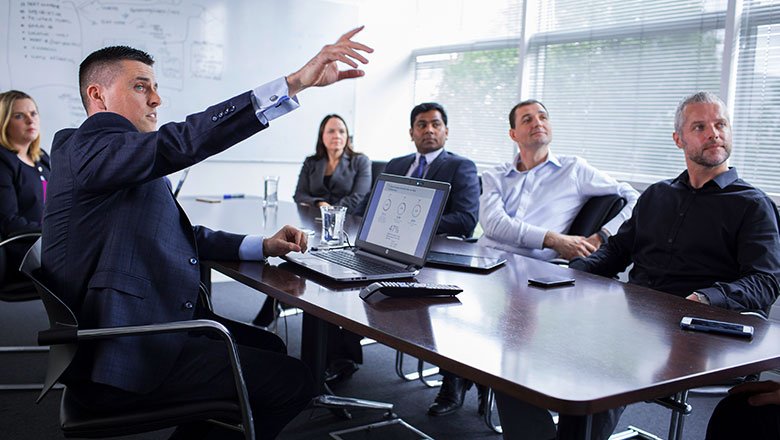A hybrid work strategy that delivers for business and employees
The last few months has seen the concept of hybrid working become a conversation topic that everyone has an opinion about. What’s clear from research, however, is that many organizations are simply not able to deliver on its promise in a way that will meet the demands of restless employees. As reported by Bain & Company, 58 percent of workers feel the pandemic has forced them to rethink the balance of work. However, 43 percent of technology leaders believe that they are behind the curve, when it comes to having the right digital services to deal with it.
Traditionally, remote working was about people connecting ‘in’ to the office, but that’s been completely flipped; now it’s about connecting ‘out’, enabling a people-centric approach to work that is less about physical location and more about virtual collaboration. And it’s employees who are leading the change. Attracting and retaining talent has become a top priority and accommodating people’s work-life expectations a massive challenge.
Ergo has been talking to businesses about the ‘modern workplace’ for the best part of a decade, delivering the ‘work anywhere’ benefits of Office 365/Microsoft 365 to organizations across every sector. It has given us a lot of insights into the value of what’s become today’s hybrid phenomenon. The resistance we once met has largely fallen away, partly because of necessity – everyone having to work from home (if they could) when lockdown hit – but also because we’ve developed and honed, a strategy that makes hybrid working truly effective.

Equality of experience
The good news is that a new wave of technology offers some of the answers. Old concerns that working remotely was less collaborative and less safe, are demonstrably untrue. Not only is a properly executed hybrid model more secure and collaborative, it also empowers employees, giving them a richer experience and a way to achieve the work-life balance they crave.
To make it work, it has to be a seamless experience, regardless of where people are – at the office in the city, at home in the countryside, on a train, or on the road visiting customers – it’s about working remotely, and yet being connected with colleagues in a way that doesn’t diminish human interactions.
You have to have a consistent equality of experience to deliver on this. When a meeting or workshop involves people inside a conference room as well as people externally connecting, it’s essential that the technology provides a unified experience, that the contribution of the people connecting in, is valued and heard with great quality audio and video, for example.
Now that it’s clear not everyone is going back to being full-time in the physical office, we need to make this hybrid experience as inclusive and effective as possible. It’s the passionate people in our companies that drive success and it’s hard to be passionate when you can’t hear or be heard, equally. Empower everyone in your organization to feel seen, heard, and included in the conversation. The connection and immersion technology is readily available – and the next wave, the Metaverse, is ever closer.
Hybrid strategies should also be data-driven, using insights to deliver continuous improvement, providing an environment that can constantly adapt to changing business requirements. The goal is to be people-centric – taking care of employees and giving them a fulfilling experience; and business smart – taking care of fundamentals like productivity enablement, with secure and easy access to tools and services.
Six interconnected components
The evolving workplace has increasingly been about cloud services, enabling secure access from anywhere. To do this effectively is a team effort on Ergo’s side, which is why we’ve spent the last decade developing specialist practice areas where the sum of the parts delivers the ultimate hybrid work model.
Essentially, there are six interconnected components that enable hybrid working, each steered by Subject Matters Experts in Ergo who are among the most qualified IT professionals on the island of Ireland.
1. Strategy and Planning
People have voted with their feet and hybrid working is here to stay. Time spent in and out of the office may vary and change again in the future, so the challenge is to create a hybrid plan that can evolve. But it must always provide employees with the experience they expect and the business with resilience to make it flexible, secure and productive.
2. Equipment and Devices
There is a baseline of laptop functionality and performance that meets the needs of most information workers, enabling them to work seamlessly from anywhere – the office, a home office, or out on the road. But mapping roles to devices may be needed for some employees, such as engineers and designers, who might need more compute power and larger screens for example.
3. Virtual Desktops
Working from anywhere on any laptop may be the ultimate expression of hybrid working. Virtualizing desktops is one way to do it; managing applications and data centrally to keep them secure, while still giving employees a seamless experience. It cuts the cost of end-user compute devices and gives the business a significant additional control plane.
4. Communication and Collaboration
Human beings work better in teams, collaborating to solve problems and sharing ideas to spark innovation. Hybrid working must expand the possibilities of teamwork, not restrict it, which is why a unified communications platform like Microsoft Teams, is a perfect gateway for collaboration. It’s about reinventing work, not replicating the way people used to do their jobs in an office.
5. Security and Governance
Liberating people to work from anywhere while maintaining the highest levels of security, is a complex paradox that every business must wrestle with. The devices employees are using, the network they are communicating over, and the cloud platforms they are connecting to, have to be secured with layers of protection (the individual’s identity, their location, the device status, the applications, and so on) to help offset the increasing sophistication of cyber threats.
6. Adoption and Change
Managing the move to hybrid and ensuring employees get the best possible experience is a big task, not just to raise productivity but to foster a workplace culture that inspires loyalty. It’s easy to forget what a big change hybrid working has been for people, and that not everyone has taken to it or is comfortable with using the technology that supports it. Any kind of change is notoriously hard for businesses to achieve, especially when it affects the way employees work. Helping them to adopt new ways of working is imperative for success.
Depending where you are on your hybrid journey, you can access any one of these components, or a combination; you can ‘switch lanes’ to implement a successful hybrid technology platform, regardless of existing investments and services. It’s a holistic way to transition both employees and the business to a hybrid working model that delivers for both.






